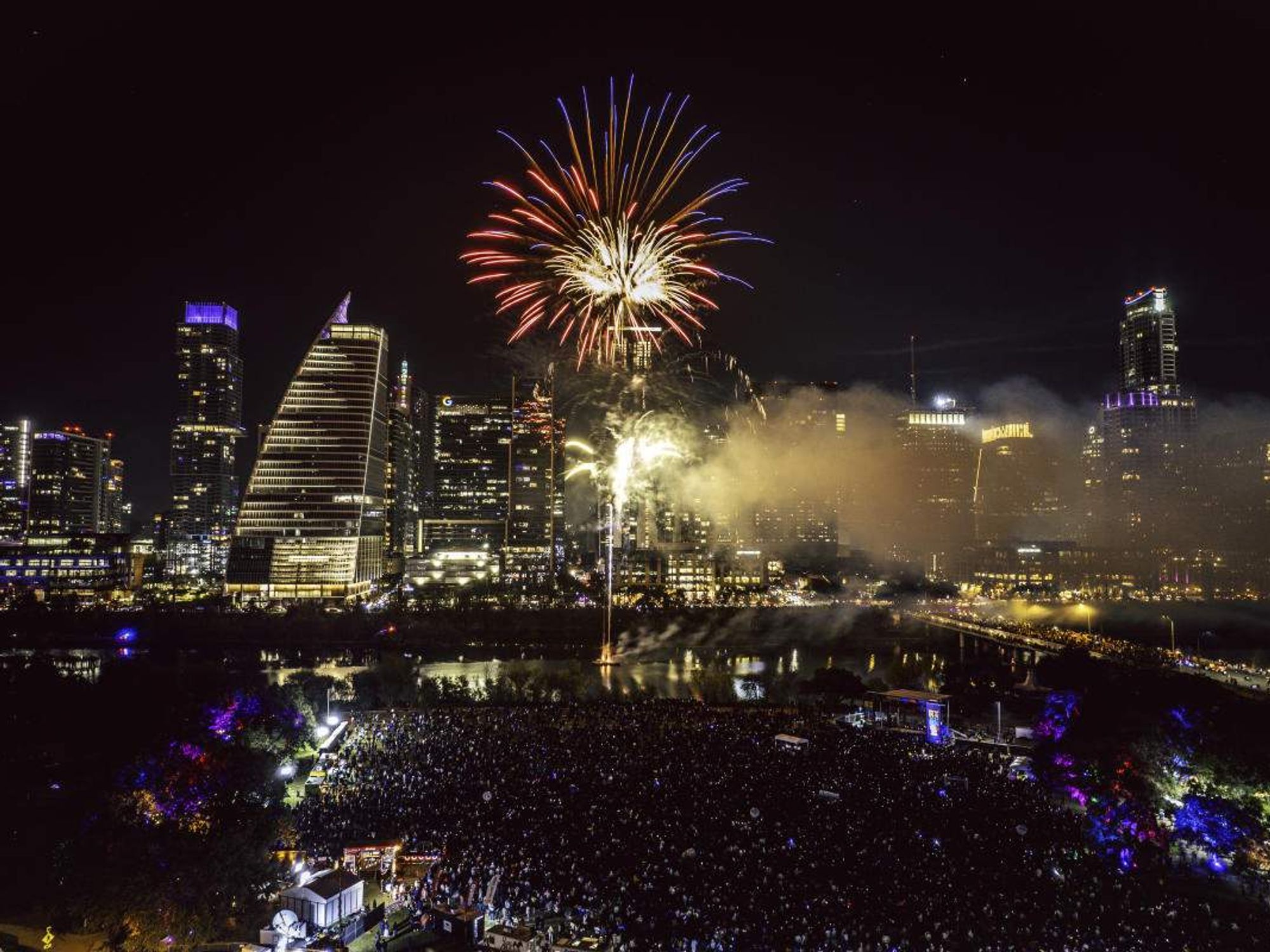A Cultural Shift
Austin will never be the same: 2014, the year that redefined our city
It's easy to argue that every year is a banner year. Here in Austin, however, 2014 marked a cultural shift, the moment where we went from Austin City Limits to Live Nation City Limits, the year where our collective drinking culture went from cute to "we need to have a conversation about this." But it wasn't all negative. Our creative community continues to thrive as does our culinary scene. We're entering a new era of Austin politics and we're having important conversations about what exactly we want our city to be.
When you watch the news cycle closely, you begin to find patterns; aspects of culture are suddenly given new relevance that they just didn't have a year, a month, or even a week before. But, as the relentless cycle rages on, it's easy to forget about these patterns and march on to the next story. Until, of course, you decide to write a recap of the year's most important events.
Getting ready for this piece was equal parts research and reflection, but what became clear was that this was the year that redefined so much of Austin's culture. The Live Music Capital of the World brand continues to grow, and our presence on the national stage is more important than ever. We leave 2014 a different city than we came in: bigger, brighter — and a little less innocent.
SXSW
It's impossible to talk about 2014 without discussing SXSW. After Rashad Owens plowed a vehicle through a crowd of festival revelers in front of the Mohawk on Red River, everyone turned to the city and the festival to see how they would react. SXSWCares, a fund to give donations directly to victims of the Red River tragedy, was established almost immediately and the collective shock among Austinites manifested itself into a feeling that, deep down, we are really all in this together.
As the rest of the city began some very difficult and important discussions (which we will get into later), SXSW remained relatively quiet after an initial press conference and release, something organizations are often advised to do in times of crisis. It wasn't until two months after the crash that the Austin American-Statesman published a scathing op-ed that instigated a reaction from Austin Chronicle publisher and SXSW co-director Nick Barbaro. That in turn ignited a comments section "report off" between Barbaro and Statesman managing editor John Bridges.
In September, results from a report commissioned by SXSW from the firm Populous were released. The main suggestions from the nine-page report were that the City of Austin should put events first, unofficial SXSW events should be reexamined and that maybe, possibly, SXSW would do better in another city. Reaction was fierce, forcing SXSW to issue a statement two days later distancing itself from the report. "The Populous report is their expert assessment and opinion, not ours, and we agree with most of it, but not all of it," SXSW said in a release.
Nine months after the 2014 event, and with SXSW 2015 on the horizon, there is still confusion. Though the festival continues to issue press releases teasing headliners and programming, it's unclear what, if any, new policies will be implemented. On December 18, the Associated Press reported that victims of the fatal crash have started the "first wave" of lawsuits, suing SXSW for wrongful death and negligence. "A festival organizer or traffic design consultant of ordinary intelligence would have anticipated the danger," the lawsuit said. Festival organizers issued another statement shuffling the blame back on Owens and noting the heartache over the lives lost.
Drinking and driving leads to civic engagement
While we are still awaiting answers from SXSW and the Austin City Council on event reform, one important conversation that did arise in the wake of the Red River tragedy was our proclivity for drinking and driving.
And what a conversation it has been. Late night host Jimmy Kimmel's joke about Austin needing an intervention was met with sobering articles asking, "Wait, does Austin have a drinking problem?" Alcohol sales prove that, yes, Austin does drink more than any other place in the Texas, though it's impossible to know what is consumed by locals and what is sold to tourists who come to party in our city. While many are reluctant to attack alcohol sales (not to mention the taxes and industry jobs that come with it), one thing we were willing to discuss was drinking and driving — and the need for transportation alternatives.
Just days after the accident, ATX Safer Streets, a grass-roots organization promoting mass transit and other transportation alternatives, was established. In less than a year, the nonprofit has garnered political prestige and played a critical part in a citywide conversation. Among the key issues ATX Safer Streets tackled was transportation networking companies (TNCs) being allowed in the city.
In June, Lyft announced it would begin operating, albeit illegally, in Austin. Uber quickly followed and the summer of the TNC battles began. Yellow Cab Austin was a vocal opponent of TNCs, noting the insurance issues that have plagued companies like Uber in other cities. In October, in part due to a massive push from the now-ousted council member Chris Riley, TNCs were legalized and allowed to operate within the city limits.
While the city made headway on the issue of TNCs, it overwhelmingly shot down a proposition in November to bring light rail to Austin. The Project Connect plan asked for a $600 million bond to create an urban rail that would run from Austin-Bergstrom International Airport to ACC Highland. Opponents of the rail argued that it would raise taxes and fail to alleviate congestion, while supporters argued it was an important step for Austin mass transit.
A city with international acclaim
Our darling airport may still only have one terminal, but that hasn't stopped world travelers from flocking to Austin. In March, British Airways began nonstop service from London Heathrow to ABIA, giving the Live Music Capital of the World direct access to Europe without a layover.
Ireland followed suit, announcing in September that it would be opening its first consulate in more than 80 years in downtown Austin. "The feeling was that the fit was best with Austin in that it is a very fast-growing, future-focused, young city," Ambassador Anne Anderson told the Irish Times in September.
Austin also played host to national television shows including The Mentalist, Jimmy Kimmel Live!, The Daily Show with Jon Stewart and Watch What Happens Live, among others.
And our creative community continues to shine. Famed director (and Hyde Park resident) Richard Linklater's epic opus Boyhood racked up international acclaim and is predicted by many critics to sweep Oscars nominations this year. Local photographer Bryan Schutmaat was asked to shoot the cover of TIME's People of the Year issue. Oh, and we certainly can't forget Le Tour de McConaughey. The actor's Academy Award for Dallas Buyers Club and impressive performance in True Detective reinvented the man with a penchant for naked bongo playing.
On the hospitality side, Austin hotels, spas and restaurants landed on "best of" lists across the world, including Vogue Australia and Conde Nast Traveler.
Our thriving culinary scene
And speaking of hospitality, we can't forget our culinary scene. From Esquire to GQ to President Barack Obama, the acclaim bestowed upon our chefs and culinary talent is extraordinary. From best restaurant nods to best chef awards to best taco lists (obviously), Austin has more than our fair share of dining superstars led, in part, by Paul Qui. In 2014, the former Top Chef winner continued to dominate and elevate the local scene.
After he was named Esquire's Chef of the Year, Tom Colicchio said Qui was the most talented chef in Top Chef history. This year, Qui's entire Austin-based operation has been lauded, from his public relations-minded fiancée Deana Saukam to his East Sixth Street flagship restaurant to his East Side King food trailer Thai-Kun, which was named one of the best new restaurants of the year by Bon Appetit.
This elevated culinary conversation, however, means a much more cutthroat environment. For all the new restaurants that opened in 2014, Austin also saw her fair share of closings, including Paggi House, Players, Flipnotics, A-OK Chinese and Tamale House.
Though the reasons behind these closures varied, some just failed to live up to the public's — and critic's — standards. Austin bloggers have rarely shied away from having an opinion, and Austin newspaper critics, led by the Statesman, are also elevating the conversation around food. Though we don't have a make-or-break critic like culinary epicenters of New York and San Francisco, the conversation is becoming more refined and better executed with every passing year.
Race in Austin
It's safe to say that no one, especially those of us who write about food, had any clue that one of the city's most pivotal conversations about race would be centered around the local restaurant scene. Or, rather, a restaurant public relations firm formerly known as Strange Fruit PR. After a conversation on Twitter ignited national outrage, many people began wondering how a company with such racist undertones in its name existed in Austin for two years without comment. It's a question we are still grappling with, and probably will for a long time.
When it comes to Austin and race, no voice was as pivotal as Dr. Eric Tang, the UT professor whose article, "Outlier: The Case of Austin’s Declining African-American Population," became the epicenter of discussions on race relations across the city when it was published in May. How, many wondered, had Austin become the only city to grow as African-Americans continue to leave at record numbers?
In his article, Tang points to segregation, gentrification, policing, disparities in public education and employment opportunities as the key factors leading to this decline. Add to this the 2014 mayoral election in which Steve Adler, a white man with no political experience, handily beat two politicians of color, Mike Martinez and Sheryl Cole, and we predict race will continue to be an important cultural discussion as we head into the new year.
Moving into 2015
Perhaps most telling are Tang's reasons for the African-American exodus. Gentrification and affordability, policing and education are issues pretty much every local worries about. How do we live with the ethos of buying local and living well when every major brand wants a part of us? What can we do so that anyone who wants to live here can afford to do so? How do we keep our culture alive as we continue to grow?
It's easy to lament a changing Austin, but it's a tired tale (and one, we should note, that the New York Times has been reporting on since at least the 1980s). Perhaps what we should do instead is focus on holding ourselves, our city, our civic leaders, and the companies that call Austin home accountable. If 2014 has taught us anything it's that these conversations are important. After all, Austin isn't just growing — it's growing up.

 Say goodbye to 2025 and hello to 2026. austintexas.org
Say goodbye to 2025 and hello to 2026. austintexas.org